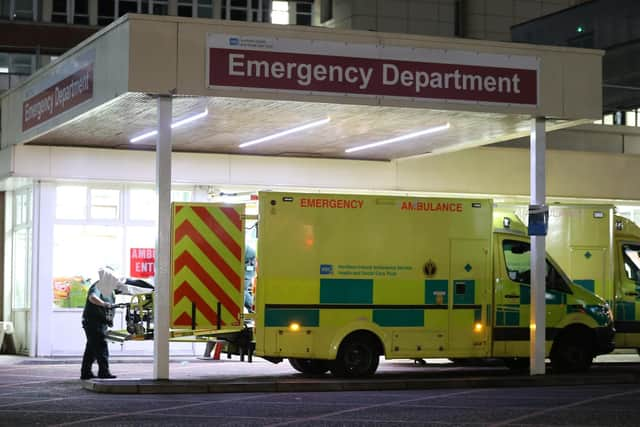Patients dying because they can't access emergency care quickly enough in Northern Ireland, leading medic warns
and live on Freeview channel 276
The chair of the British Medical Association’s (BMA) Northern Ireland committee said the delays in emergency care resulting from the intense pressure on the hospital system is leading .
Leading GP and former emergency department (ED) medic Dr Tom Black was speaking to the News Letter following confirmation that the Northern Ireland Ambulance Service is now probing the deaths of eight patients since Christmas Eve to determine if delayed responses were a contributory factor.
Advertisement
Hide AdAdvertisement
Hide AdEarlier this week, the Department of Health launched an appeal for public support in alleviating what it described as the “unprecedented” pressures on the hospital system, with dozens of patients left to wait for care on trolleys around EDs across Northern Ireland.


Dr Black said the long delays is now leading to an increase in mortality.
"I’ve said this before, but things just keep getting worse,” he said. “This is the busiest it’s ever been. We’ve never seen so many patients waiting in ED before. Many of the EDs are looking at 60, 70, 80 patients.
"How do you run an ED when you don’t have anywhere to see the patients coming in that day, when you still have patients waiting from the day before, and the day before, and the day before that?
Advertisement
Hide AdAdvertisement
Hide Ad"That’s the bottleneck in the system and that’s what causing so many of the problems that we’re seeing."
He continued: “We now see that ambulances are struggling. We see now that they’re running inquiries into serious adverse incidents following the deaths of a number of patients. That’s very worrying. We’re not providing a good service in ED, and as a result of that it’s really stymieing the service from our ambulances. At the same time, we’ve got lots of pressures within general practice and patients in general practice who would normally be admitted to the wards can’t get into the wards now. You can see the whole system is log-jammed from front to back, and of course we know about the social care discharges from the wards and the difficulties in getting patients out of the hospitals.”
Asked if the eight deaths being explored by the ambulance service reflected the fact that people are now beginning to die as a result of the problems in the health service, Dr Black said: “Yes. At the beginning of this week the Royal College of Emergency Medicine said that if you have delays of more than six hours at ED there is an increased mortality rate. The research shows that you can’t keep people waiting for more than six hours or there will be an increase in deaths. I think that’s what we’re seeing. We’re seeing patients waiting two and three days.”
He continued: “This isn’t the fault of the ED doctors and nurses who are working very hard – it’s the fault of a system that can’t admit patients into the ward, and then can’t get them discharged from the wards into social care.
Advertisement
Hide AdAdvertisement
Hide Ad“We’ve been saying this for a long time – the service is underfunded, understaffed, and doesn’t have enough hospital beds.
“I’ll reiterate the point I keep making, that in France they have twice as many hospital beds as we do per head of population and in Germany they have three times as many. You can’t run a system as tightly as it’s being run and then come against covid, or flu or bronchiolitis epidemic and expect to be able to cope. You won’t be able to cope. You have to have some slack in the system to take into account these winter pressures. There hasn’t been slack in the system for a number of years.
“EDs aren’t set up for coping with all these patients still in ED. When I worked in ED many years ago, you never had more than one or two patients waiting to be admitted to hospital. Now you have 60, 70, 80 and there is actually no space to let the new patients through. That’s the big thing that’s causing the problems.”
Asked if the intense pressures being experienced right now are likely to ease in the near future, Dr Black said: “No, I think it’ll continue for another few months. I don’t think we’ve seen the peak of the influenza epidemic yet. There’s covid variants causing infection in the United States at the moment that we’re worried about and are watching very closely, plus there’s all the usual winter pressures, so I think we’re going to January, February and March continuing in a similar direction.”
Asked if it could get even worse, Dr Black said: “I would hope not. I think this January, February and March will be harder than previous years but I would hope that it won’t get worse.”